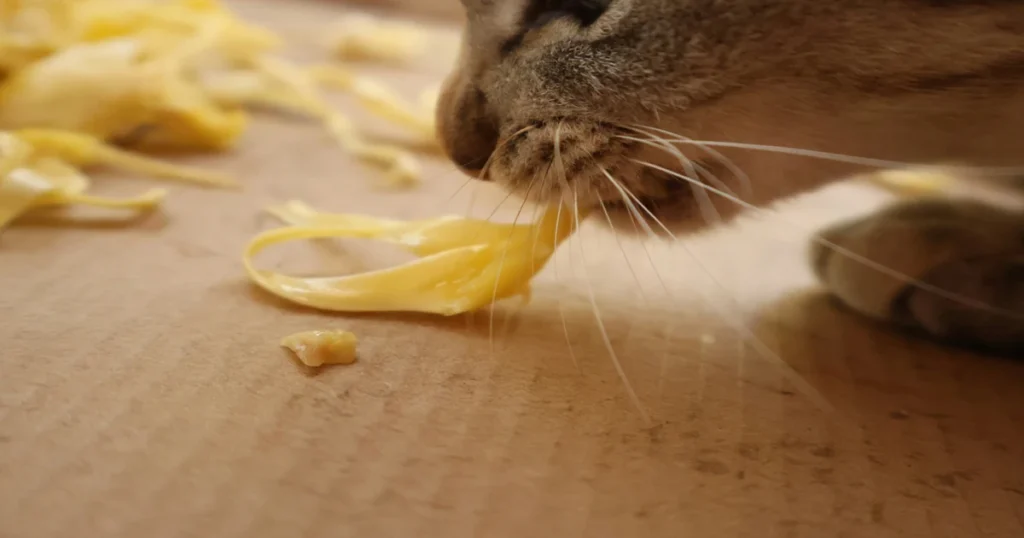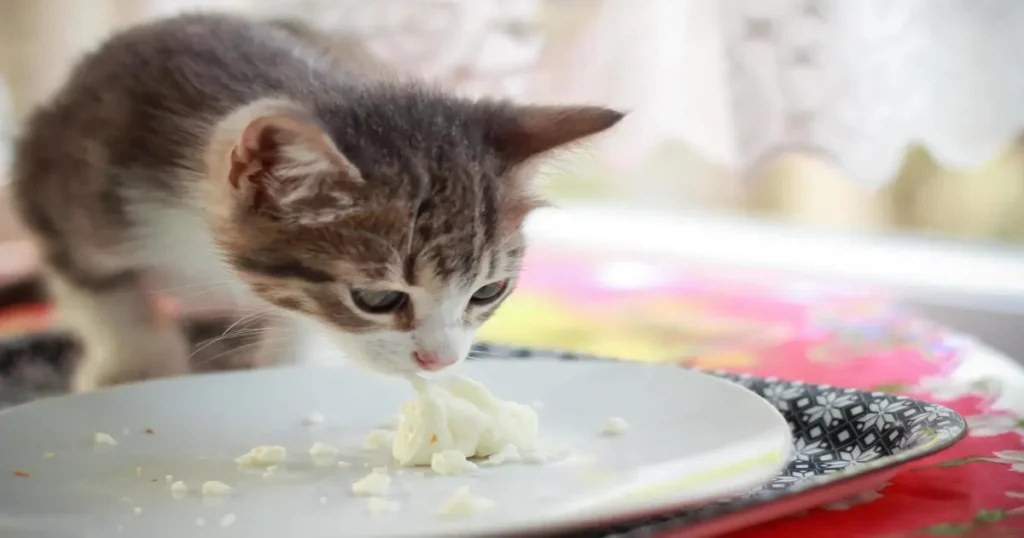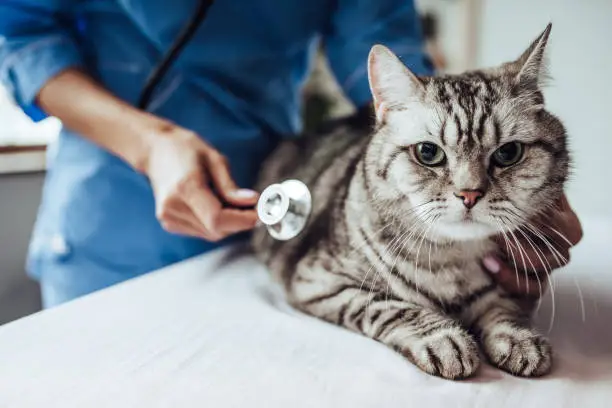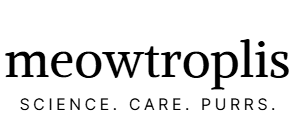We love our cats. We also like cheese. It is surprising that it is okay to share a little bit. Can cats eat cheese? Is it safe? The answer can be “yes” or “no”. While many cats believe in smell and taste, their bodies are not made like ours. Most adult cats struggle to digest dairy properly.
Many cat parents face this exact issue daily. Good news meowtroplis is here to help you? Yes, cats can eat cheese, but under certain conditions.
Can Cats Eat Cheese Safely?
Yes, some cats can sometimes eat tiny pieces of certain things. However, it comes with important circumstances that each cat owner must understand.
Here is how you can give your cat cheese safely::
- Provide dice-shaped pieces only as a rare behavior.
- Choose low-lactose, old cheese, like cakes or Swiss cheese.
- Never feed never kittens under 12 weeks.
- If your cat bothers your digestion, stop immediately.
- Take a quick word with your Vet before feeding any kind of cheese.
Think of cheese as you would any special treat, something that happens occasionally, not daily. Most cats can handle small amounts easily. But some cats should never eat cheese at all. We’ll explore exactly which cats fall into each category.

Why Adult Cats Struggle With Dairy?
The Reality Behind Cat’s Lactose Intolerance:
Most cats are not able to digest dairy, but does this mean your cat also can’t?
Cats produce the enzyme lactase at birth. Lactose, a sugar present in milk and dairy products, is broken down by this enzyme. During nursing, kittens need this enzyme to break down their mother’s milk.
But things change here. When cats age, their bodies begin to produce less lactase, making them lactose intolerant. It usually occurs around 12 weeks of age, well when most kittens are removed from their mothers.
When they first have to think about losing a superpower. Adult cats are not able to eat dairy in the way they can as kittens.
What Is the Effect of Cheese On Lactose-Intolerant Cats?
The digestive system of your lactose-intolerant cat suffers when it consumes cheese. Their intestines are undesken lactose. This fermentation process causes many unpleasant symptoms:
Signs of lactose intolerance:
- Loose motions or diarrhea in 8-12 hours
- Stomach cramps and discomfort
- Excessive gas and inflammation
- Vomiting in severe cases
- Appetite loss
You will notice the symptoms within a few hours after eating cheese. The severity depends on how much cheese your cat is eating and their personal sensitivity level.
Some cats show small amounts of mild symptoms. Others may also have serious reactions to small portions. This is why it is important to know if your cat is lactose-tolerant.
Which Types of Cheese Are Safe for Cats?
When it comes to cat safety, not all cheeses are made equal. The amount of lactose in each type is drastically different. Let’s break down the safer options versus those you should avoid completely.
Lower-Risk Cheese Options for Cats
Because of the ageing process, these cheeses contain less lactose. The natural breakdown of lactose increases with the age of the cheese.
Hard, Aged Cheeses:
- Cheddar Cheese: Cheddar is often mentioned as a small lactose alternative for cats. The sharp or extra-shaped variants contain less lactose than chandeliers. Once a week, a small cube can be tolerable for some cats.
- Swiss Cheese: Small holes in Swiss cheese are due to bacterial fermentation. This process significantly reduces the lactose content. Swiss is usually less than 1 gram of lactose per ounce.
- Parmesan Cheese: Parmesan has almost no lactose for at least 12 months. However, it is very high in sodium, so parts must be too small – think of a small bunch.
- Gouda: When it ages properly, Gouda develops a difficult texture and loses most of the lactose. Choose old variants on young, soft Gouda.
- Important portion guideline: Even with these “safe” things, stick to cube-shaped cubes. It is about 1/4 tsp or less.
High-Risk Cheeses to Avoid Completely
These cheese types pose significant risks to cats and should never be offered.
Fresh Cheeses With High Lactose::
- Cottage Cheese: Although it is very popular but cottage cheese has high lactose content. It also has extra sodium that can affect your cat’s kidneys.
- Ricotta Cheese: This fresh cheese is mainly made from milk. The lactose material is very high and is almost guaranteed to disrupt digestion.
- Fresh Mozzarella: While aged mozzarella may have less lactose, fresh mozzarella retains most of the milk sugar. Soft textures also make it easier for cats to eat too much.
Dangerous Cheese Varieties:
- Blue cheese: Has mould compounds that could be harmful. It’s also possible that the strong flavour contains cat-toxic seasonings like garlic or onions.
- Feta cheese: It is frequently kept in brine and has a very high sodium content. Just the amount of salt in it can have major negative effects on your feline health.
- Processed Cheese Products: Products such as slices of American cheese have more lactose than natural cheeses, artificial additives, and too much sodium.
Consider This Before Selecting Cheese:
- Lactose-Free Cheese: Some manufacturers make lactose-free cheese varieties. Although this cheese eliminates the problem, they still have high sodium and fat which are not good for cats.
- Organic vs. Conventional: Organic foods do not always contain low lactose, but they do avoid artificial additives that can cause additional sensitivity.
- Flavored Cheeses: Never feed your cat the cheese with added herbs, garlic, onions, or other spices. Many common flavors are toxic to cats.

How Much Cheese Can Cats Have?
The size of the part is absolutely important for the cat’s safety. Excessive cheese, even “safe” varieties, can cause serious health problems.
Proper Portion Sizes by Cat Weight
For Average Adult Cats (8-12 pounds):
- Maximum serving of a small dice-sized cube
- Frequency: No more than once a week
- Visual Guide: About the size of the cat’s front claw -Pads
For Larger Cats (13-18 pounds):
- Maximum serving: Slightly larger than a dice, but still small
- Frequency: Maximum once per week
- Consider your cat’s overall calorie needs
For Senior Cats (7+ years):
- Reduce portions by half
- Monitor more closely for digestive issues
- Consider underlying health conditions
How to Introduce Cheese To Your Cat Safely?
Never surprise your cat’s digestive system with cheese. Follow this step-by-step introduction process:
- Day 1: Offer a piece the size of a small pea. Watch for 24 hours.
- Days 2-3: Monitor for any digestive changes, loose stools, or behavioral changes.
- Day 4: If no problems occurred, you can occasionally offer very small amounts.
Red flags to stop immediately:
- Any vomiting within 12 hours
- Diarrhea or loose stools
- Appetite loss
- Inactivity or distress
Guidelines For Age-Specific Cats
- Kittens (Under 6 months): Youn kittens have small digestive systems which are still in development. Avoid feeding them cheese as their stomachs are lactose sensitive.
- Adult Cats (6 months to 7 years): If an adult cat does not show lactose sensitivity then you can give them once a week. Only feed a small piece of cheese.
- Senior Cats (7+ years): Senior cats have slow metabolisms, and due to which it is risky to give them cheese. Even a small piece can show signs of sensitivity.
Health Risks Every Cat Owner Should Know
Although some cats may tolerate small amounts of the right kind of cheese, you should be aware of the serious risks.
Immediate Health Concerns
- Digestive Upset: This is the most typical initial reaction. Foods high in lactose can cause vomiting and diarrhoea in cats. Dehydration may result from these symptoms, particularly in small or elderly cats.
- Allergic Reactions: Due to lactose intolerance, some cats develop their own to dairy. Itching, ear inflammation, or respiratory issues are possible symptoms.
- Choking Hazards: If hard cheeses are served in big chunks, they can cause risks of choking. Cheese should always be cut to the proper size.
Long-Term Health Risks
- Obesity and Weight Management: Cheese has a lot of calories. Consumption of cheese repeatedly can cause excessive weight gain. About 110 calories, or about 10%of the daily caloric requirements of a specific cat, are found in just one ounce of the cake.
- Kidney Disease Considerations: High sodium content in most things can stress kidney function. Cats with existing kidney problems should never have cheese.
- Pancreatitis Risk: The high fat content in cheese can trigger pancreatitis in sensitive cats. This painful condition requires immediate veterinary treatment.
Cats Who Should Never Eat Cheese
Medical Conditions that Rule Out Cheese:
- Kidney disease or dysfunction
- History of pancreatitis
- Inflammatory bowel disease
- Food allergies
- Diabetes (due to High caloric content)

Expert Veterinary Point of View on Cats and Cheese
According to Dr. Jennifer, a board-certified veterinarian, cats do not require a nutritional requirement for cheese. Although a small amount of cheese as a treatment usually will not damage the cat, it can be disturbed by the gastrointestinal tract. “
Dr. Jennifer’s Quotes extend to veterinary medicine for 25 years. Her research highlights that cats are carnivorous with very specific nutritional requirements. Cheese is not just part of their natural diet.
Cheese should never take the place of proper cat food. The product is only intended for topical use; it is not a dietary supplement.
When Should You Consult Your Veterinarian
Schedule a vet consultation before offering cheese if your cat has:
- Any chronic health conditions
- A history of digestive sensitivity
- Previous allergic reactions to foods
- Takes regular medications
After your cat has eaten cheese, call your veterinarian right away if they show:
- Vomiting or diarrhea
- Pain or distress
- Dehydration
- Boredom
Your veterinarian knows your cat’s health profile. They can provide personalized advice about whether cheese treats are appropriate.
When Cheese Might Actually Help
While cheese isn’t nutritionally necessary, there are some practical situations where it might be useful.
Hiding Medications in Cheese
Many cat owners struggle with giving pills to their pets. Small amounts of soft cheese can help mask medication. However, this approach has important limitations:
Best cheese types for pills:
- Cream cheese (very small amounts)
- Soft cheddar
- String cheese (pulled apart)
Important considerations:
- Check with your vet first; some medications interact with dairy.
- Use the smallest amount of cheese possible.
- Don’t make this a daily occurrence.
- Have backup pill-giving methods ready.
Training and Bonding Applications
High-value treats can be useful for training, but cheese has limitations here, too.
Why cheese might work for training:
- Many cats find it highly appealing
- Small pieces are easy to give quickly
- Can be cut to precise sizes
Why it’s not Good:
- Too high in calories for frequent training sessions
- Can cause digestive issues with repeated use
- Not all cats can tolerate it
Healthy Alternatives to Cheese Treats
Instead of risking cheese-related problems, consider these cat-safe alternatives that provide similar satisfaction.
Cat-Safe Human Foods
- Cooked Chicken: Small pieces of regular, ripe chicken breast are ideal. They have a lot of protein, and most cats love them. Remove all bones and spices.
- Cooked Fish: Small Parts of Cooked Salmon or Tuna (Without Bones or Spices). Limit frequency due to concerns for mercury.
- Freeze-Dried Meats: Many pet stores offer freezing drought chicken, fish or liver behavior. These provide concentrated taste without additives.
Commercial Cat Treats
- Cheese-Flavored Cat Treats: These products are specially designed for digestion, similar to cats. They give a thing taste without lacti-risk.
- Freeze-Dried Options: Freeze-dried treats contain single ingredients and no additives.
- Training Treats: Small, soft training treats are designed for frequent use without disrupting digestion.
Nutritional Comparison
When comparing cheese to cat-appropriate treats:
- Cheese (1 cube): ~15 calories, high sodium, potential digestive issues.
- Freeze-dried chicken(equivalent size): ~5 calories, high protein, and digestive-friendly.
- Commercial cat treat: ~2-3 calories, formulated for cats, various flavors available
The alternatives provide better nutritional benefits with less risks.
Frequently Asked Questions About Cats and Cheese
Can kittens eat cheese?
No, kitten should never eat cheese. Kittens are already eight-week-old lactose intolerant, and high fat and salt materials also pose a higher risk to young cats. Their developing digestive systems cannot safely handle dairy products.
What happens if my cat eats too much cheese?
If your cat eats too much cheese, observe the symptoms like dehydration, vomiting and diarrhea for 12 hours. If the symptoms are severe, immediately call your veterinarian immediately. Make sure things and deliver fresh water.
Is string cheese safe for cats?
String cheese is usually Mozerela, which has a level of moderate lactose. Although it is not the highest risk cheese, it is still not ideal for cats. If you are going to share, draw a very little piece and monitor for reactions.
Can cats eat mac and cheese?
Not at all. Pasta (unnecessary carbohydrates), processed cheese sauce (high lactose and sodium), and frequently garlic or onion powder (toxic to cats) are some of the problematic ingredients found in mac and cheese.
Are there any cheeses that are completely safe?
No cheese is completely risk-free for cats. Even aged, low-lactose varieties still contain high sodium and fat levels. The concept of “safe” cheese for cats is relative, meaning some are less risky than others, not risk-free.
How do I know if my cat is lactose intolerant?
Most cats are lactose intolerant from birth. If your cat has eaten some dairy, look for signs like vomiting, dehydration, etc. If the cat shows symptoms, then your cat is lactose intolerant.
Can cheese cause kidney problems in cats?
Yes, the high sodium content in most cheeses can strain kidney function over time. Cats with existing kidney disease should never have cheese. Even healthy cats shouldn’t have cheese regularly due to this risk.
Is it okay to give cheese daily?
Never give cheese daily. The maximum recommended frequency is once per week for cats who tolerate it well. Daily cheese consumption can lead to obesity, kidney strain, and digestive problems.
